BBC correspondents make US 2016 election predictions
- Published
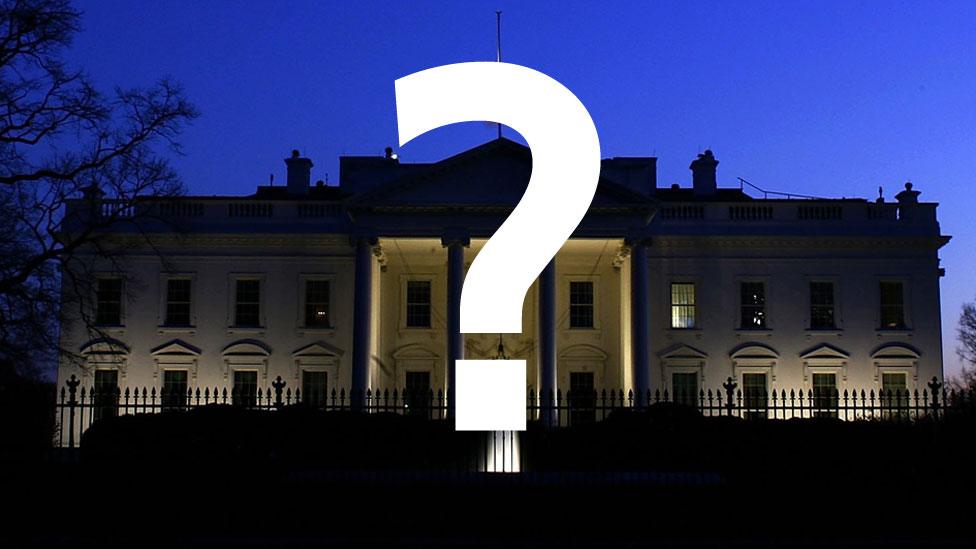
It's a year out from the US presidential election. What do BBC reporters think will happen?
This time next year, barring a repeat of the cliffhanger election of 2000, we will know who the next president of the United States will be.
Before the votes are cast and counted, however, the candidates must survive a campaign that so far has confounded conventional wisdom.
Despite the risks, our team of BBC experts agreed to take a stab at how they think events will unfold in 2016.

Jon Sopel, BBC North America Editor
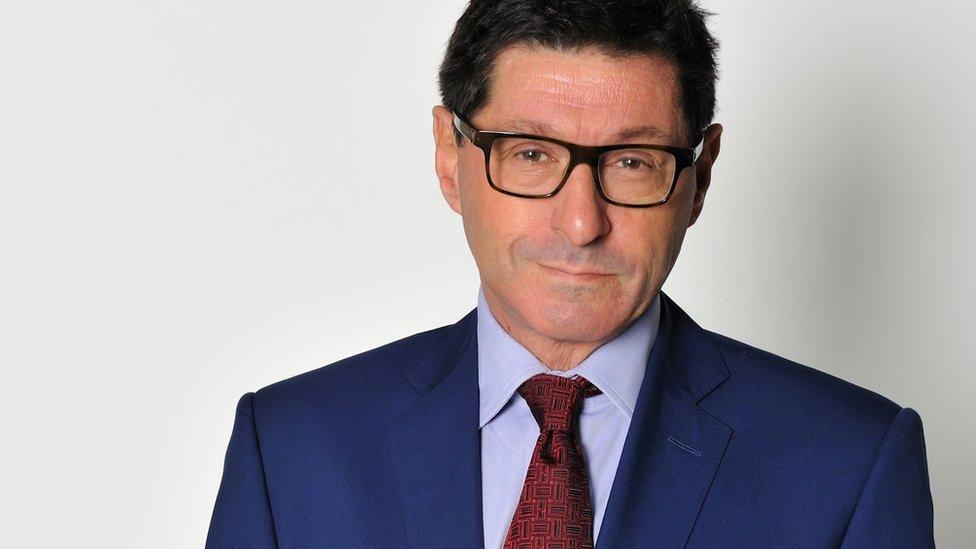
Who will win the first-in-the-nation Iowa caucuses?
Ben Carson - I am not sure his view on the Egyptian pyramids being a grain store will be a help or hindrance in this farming state, but his evangelical views and outsider status will be a big help and will see him emerge victorious.
Hillary Clinton will do what she failed to do in 2008 and win Iowa.
What issue/factors will be decisive in the nomination battle (for both parties)?
Longevity, ground game, money, the polls - naturally.
But ideological purity whether on the left or right will only carry you so far. Candidates have to appeal to a broad swath of the electorate, and convince voters that they are the answer to what America needs and wants
How will the 2016 campaign be different to any previous election?
Insurgency politics. There seems to be a willingness, yearning even, to embrace the outspoken, the outsider, the untried and untested like never before. I have heard it described as the "post-truth age of politics", where empirical data and analysis are a hindrance.
Who will be on the final ticket for each party?
Predictable one: Hillary Clinton for the Democrats. Unpredictable left field GOP option: John Kasich.

Katty Kay, Presenter, BBC World News America
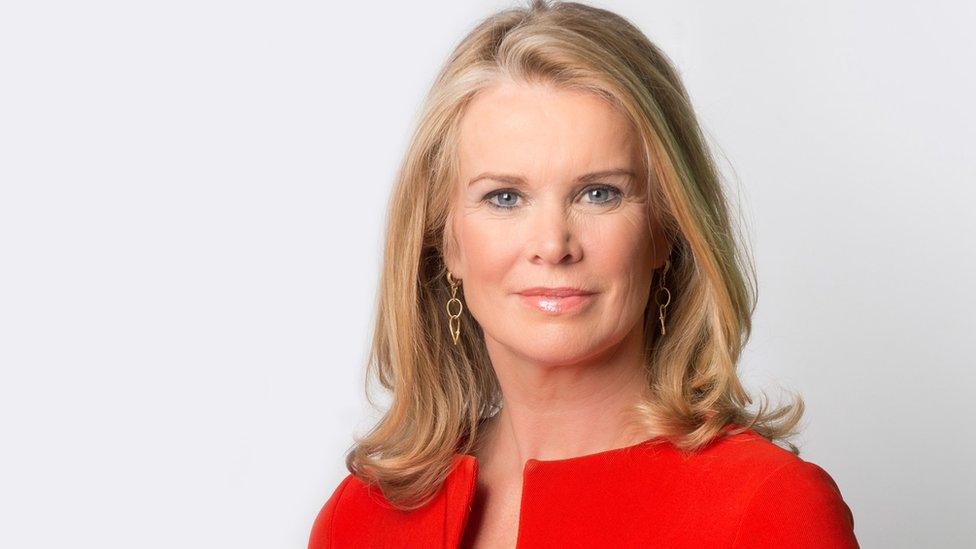
Who wins in Iowa?
Ben Carson for the same reasons Rick Santorum won in 2012, Dr Carson is a true evangelical conservative.
Hillary Clinton - she lost it last time. Do you really think she's going to lose it again?
What decides the nomination?
Getting out the vote. Getting out the vote. Getting out the vote. Ask Mitt Romney.
How will 2016 be different?
It already is different. We've never seen anything like this. Take record dissatisfaction with politicians, a political system that has failed to produce results for the past six years, and a desire for simplicity and reassurance in a time of complexity and disquiet and you have the perfect setting for political chaos (and that's not just in the US).
Who will be on the ticket?
I am not qualified to answer this question. On the day Trump announced, I said that would be the highlight of his campaign. I take little comfort from the fact that 90% of my colleagues said the same thing. However, if you put a gun to my head, or threaten to suspend my pay if I don't answer, I'd probably mumble very quietly, so almost no one could hear.….Rubio and Hillary. (Actually I'd say, and have said all along, "Hillary" in a more confident voice.)

Anthony Zurcher, BBC North America Reporter
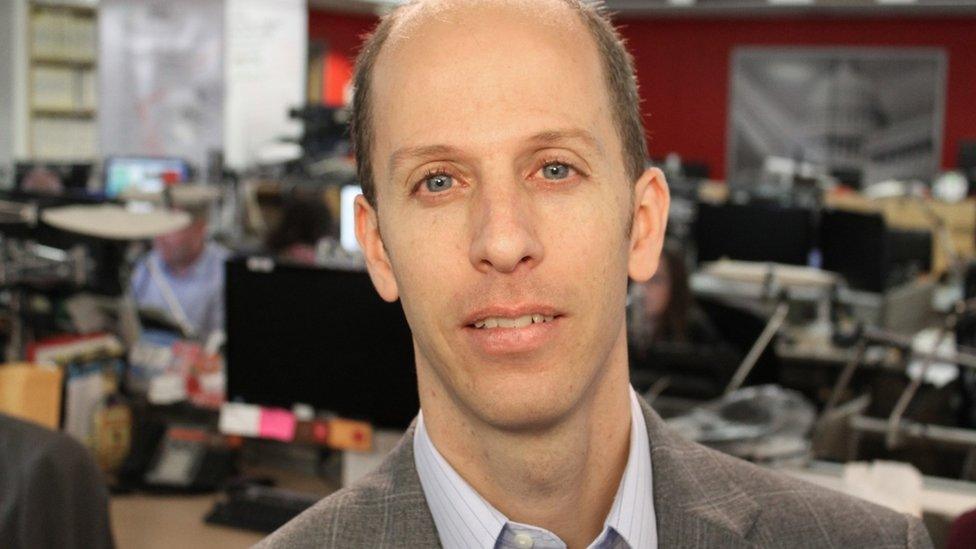
Who wins in Iowa?
Although Donald Trump and Ben Carson currently lead the polls on the Republican side, Texas Senator Ted Cruz has the money, grass-roots organisation and evangelical appeal to eke out a narrow win in the first-in-the-nation caucuses.
Democrat Hillary Clinton lost Iowa to Barack Obama in 2008 in part because she didn't spend enough time courting the notoriously fickle voters in smaller, more personal settings.
She's not making that mistake this time around, and combined with a massive team of on-the-ground personnel, she cruises to victory.
What decides the nomination?
The 2016 Democratic nomination effectively was decided in 2008, when Hillary Clinton and her husband, Bill Clinton, played the good soldiers and campaigned for Barack Obama despite a bruising primary battle that went all the way to the wire.
It will take some time for the Republican nomination to be locked up, but when it is it will be due to the party's delegate math. As campaign guru Charlie Cook points out, external, Republican voters in populous left-leaning "blue zone" states have a disproportionate influence on the nominating process. These voters tend to give the nod to a more moderate, electable choice.
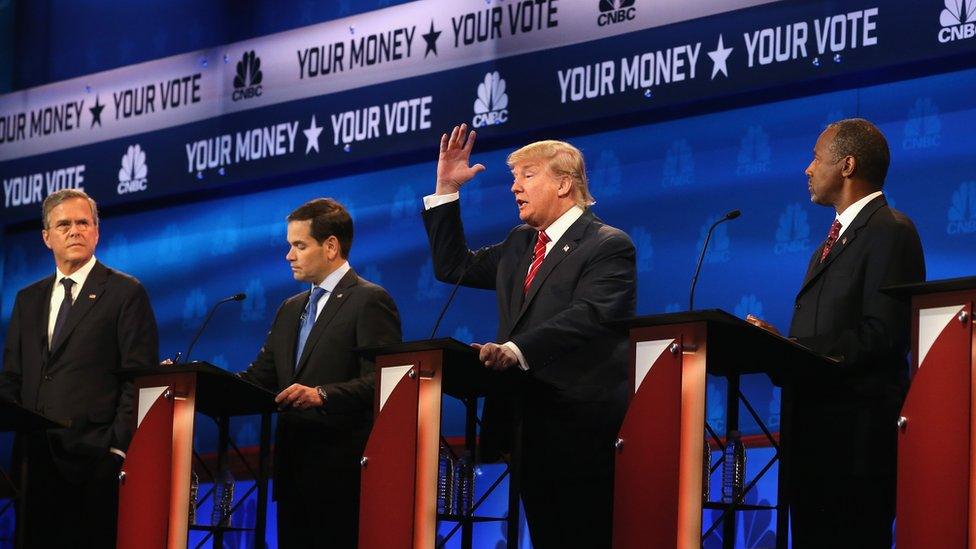
Anthony Zurcher predicts Marco Rubio (left-centre) will win the Republican nomination
How will 2016 be different?
The 2008 and 2012 elections were all about how social networks had revolutionised presidential campaigns by allowing likeminded people to meld into a powerful political force. In 2016 we will see this technology have an opposite, fragmentary effect. Narrow political interests, empowered by the social media megaphone, will have a corrosive effect on party unity.
Bernie Sanders progressives and Black Lives Matters activists won't be reliable team players for the Democrats, and neither will Tea Party grass-roots conservatives or Donald Trump nativists on the Republican side.
Who will be on the ticket?
For the Republicans it's Marco Rubio and Nikki Haley for vice president. The Florida senator emerges as the establishment pick and outlasts Donald Trump and Texas Senator Ted Cruz, who divide up the outsider/anti-establishment vote.
Mr Rubio opts to put a woman on the ticket and goes for Ms Haley - the young, charismatic governor of South Carolina who gained national recognition after the Charleston shootings.
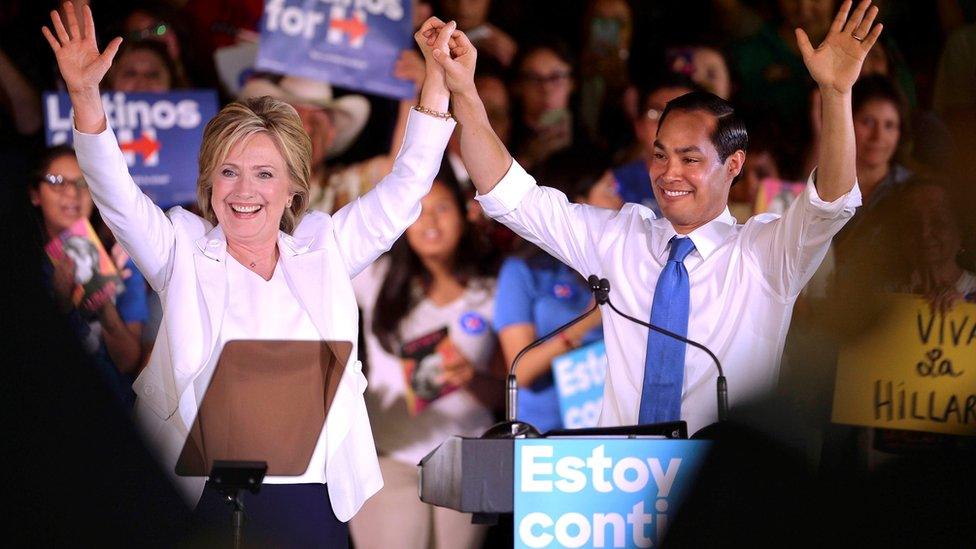
A future Clinton-Castro ticket?
The Democratic team will be Hillary Clinton and Julian Castro. The former secretary of state surely will have a few more bumps on the road to the nomination, but the Sanders swoon has played itself out.
In a move to court the Latino vote, she picks the charismatic but untested Housing and Urban Development secretary, who served three terms as mayor of San Antonio.

Nick Bryant, BBC New York Correspondent
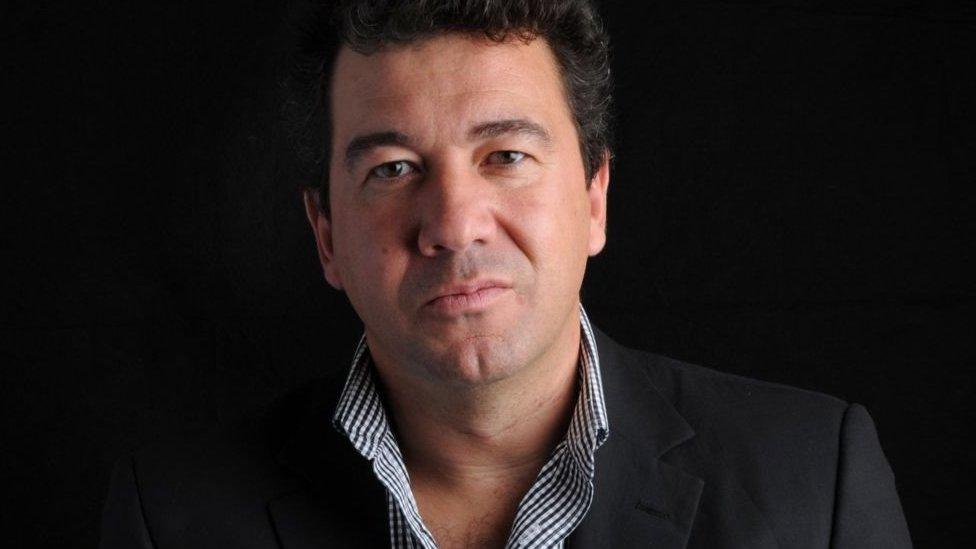
Who wins in Iowa?
On the Republican side, Iowa has not been indicative in recent cycles of who will become the eventual nominee. In 2012, the winner was Rick Santorum. In 2008, Mike Huckabee won. So let's not obsess about who comes out on top in the Hawkeye state.
Democratic caucus-goers in Iowa are better at picking their party's eventual presidential nominees. I'm assuming they'll opt for Hillary Clinton.
What decides the nomination?
On the GOP side, will Republican primary voters ultimately adhere to something approaching normal political rules, and opt for a candidate who has a plausible chance of winning a national election, or will the insurgent anger that is propelling Ben Carson and Donald Trump eventually win out? Right now, given the dominance of the outsider candidates, it looks like they will not just rip up the rulebook, but nuke it. The new normal in GOP politics is that there is no normal.
On the Democratic side, Hillary Clinton already has the aura of inevitability. Imagining scenarios that will derail her takes you into the terrain of federal indictments in connection with her private email server or some other catastrophic revelation, which the Clintons have a habit of surviving in any case. Remember New Hampshire in 1992? Remember impeachment?
How will the 2016 be different?
In 1996, I thought Bob Dole would emerge as the Republican nominee. In 2000, I thought George W Bush. In 2008, John McCain seemed the obvious choice. In 2012, Mitt Romney.
None of this involved any great perspicacity. On the contrary, it seemed obvious.
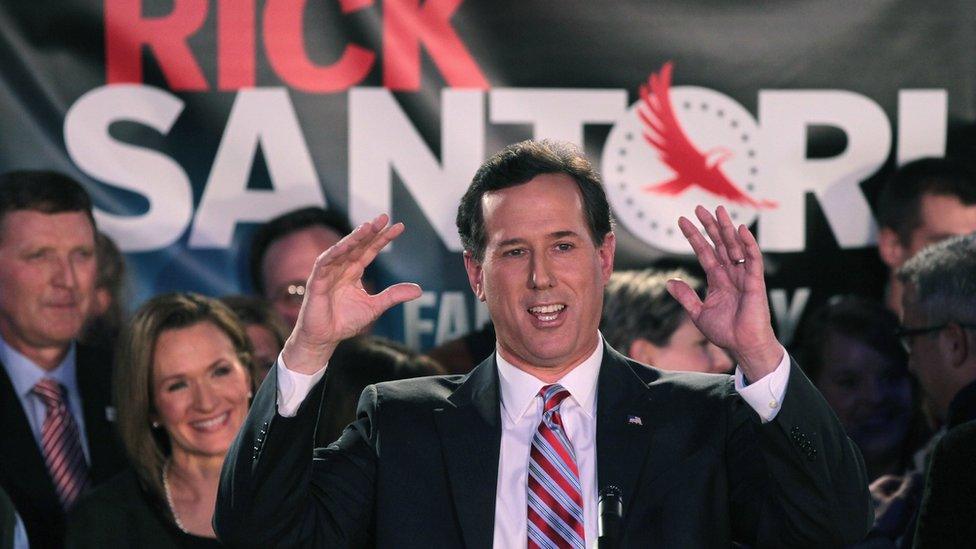
Iowa - while first state to vote in the nation - does not necessarily predict the nominee
The biggest change this year, then, from previous contests is the unpredictability of the Republican primary race. Pundits make predictions based on political rationality: Who passes the plausibility test? Who looks like a president?
Republican primary voters, this cycle more than any other, are marked more by rebelliousness than rationality.
Who will be on the ticket?
Two women, I suspect, will feature. Hillary Clinton will lead the Democratic ticket. Because of the party's advantages in the Electoral College and demographic factors, such as the relative shrinkage of America's white male electorate, she should start the race as favourite to become president.
Carly Fiorina is positioning herself as a strong contender for the vice-presidential slot on the GOP ticket.
As for the GOP's presidential nominee? See above. But I'm not anticipating a dynastic showdown between Clinton and Bush.